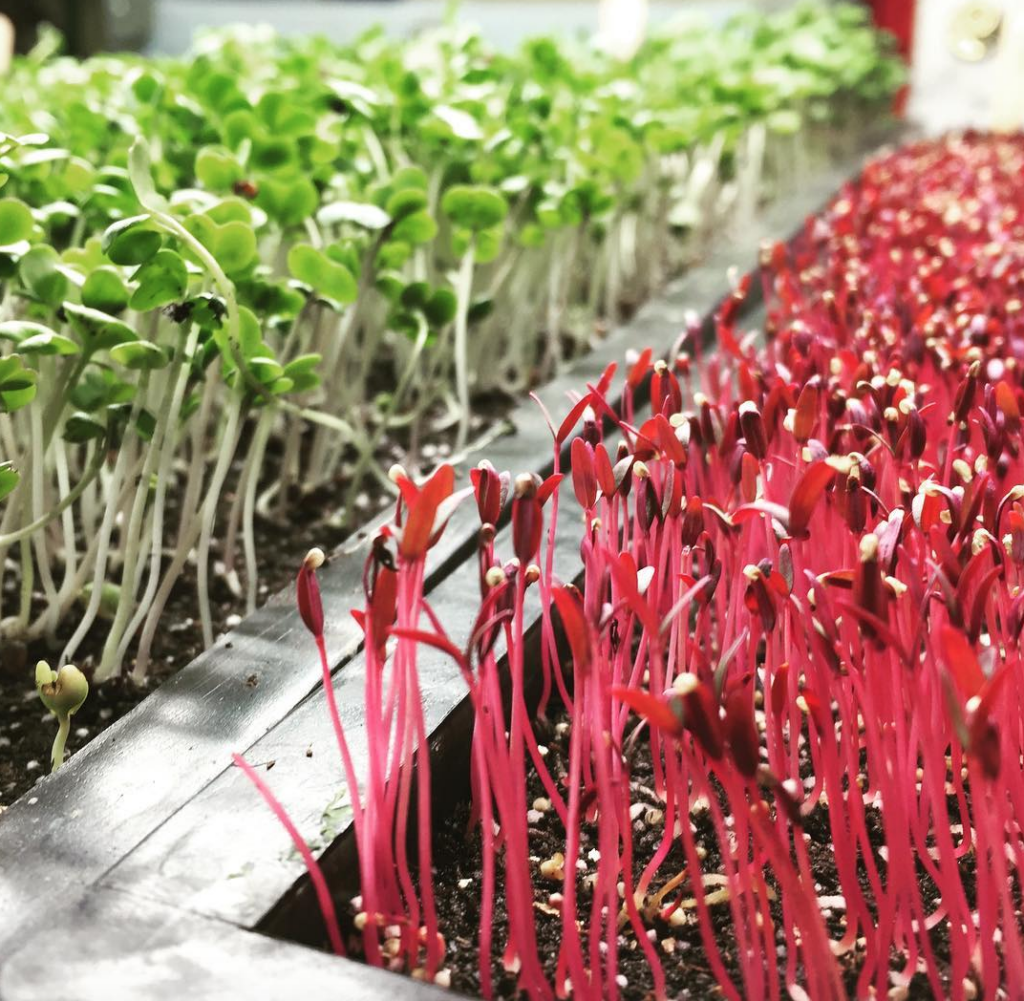“Microgreens” is a marketing term used to describe edible greens that germinate from the seeds of herbs and vegetables and are harvested without roots when they are seedlings. These flavorful cotyledons make a great addition to many meals and pack a real nutritional punch.
Microgreens are on the rise…literally!
Not only are these tiny vegetables trendy, but they also grow fast (they’re often ready for harvest in about two weeks!), and can be sold at a premium. This makes them a great option for a wide variety of growing operations.
Just because these greens are little doesn’t mean they go unchecked! Keep reading to make sure you’re up to snuff on your Certified Naturally Grown standards for microgreens.
Do your Microgreens Make the Cut?
We’ve developed a handy checklist to help you determine if CNG is a good fit for you:
- I sell directly through farmers markets, CSAs, and local food businesses.
- I don’t use any synthetic chemicals in production, but may use a hydrogen peroxide vinegar mix for sanitizing.
- I never use chemically treated or GMO seeds
- I use a natural growing medium such as potting mix, coconut coir or hemp mats.
- I use clean water to grow and wash my greens.
- I maintain a clean growing area to limit fungal disease and pest pressure.
- I want a credible certification that’s affordable and has high standards to promote my commitment to natural growing practices.
- I’d enjoy connecting with like-minded microgreens producers nationwide.
- I want to feel a sense of ownership and pride in being part of a well-regarded grassroots initiative
Does this sound like you? Consider joining CNG!
Microgreens versus Sprouts
While both sprouts and microgreens refer to crops that are harvested without roots at a very young age, they have a key distinction: sprouts are crops that germinate and grow without soil, while microgreens are grown in a soil medium or substrate.

For Sprouts Growers
If you grow sprouts, we would require an annual water test. As with our Aquaponics Standards, the annual test should pay particular attention to levels of chloride, chloramine, and heavy metals. Please see our Water Testing Guidance for Edible Sprout Growers for specific information about what water testing protocol you need to follow. Additionally, seeds used for edible sprouts always must be certified organic or Certified Naturally Grown.
Soil Media
We define soil as, “Organic matter that is rich in plant-available nutrients that can sustain plant life with no additional inputs.”
In the case of microgreens, the soil medium is often a potting mix or coconut coir.
Hydroponics?
CNG does not certify hydroponic operations. We discovered that there are very few commercially viable hydroponic operations that rely on natural fertility sources. The NOP has recently begun to certify hydroponic operation and allowed the use of synthetic, OMRI-listed nutrient solutions. CNG does not allow the use of these synthetic nutrient solutions. We do, however, certify aquaponics operations, as these systems rely on naturally derived nutrients from fish!
Prohibited Substances in Growing Media
- Ash from manure burning
- Chemically-processed minerals, including quick lime and sugar lime
- Compost with sewage sludge
- Glossy paper or paper with colored ink
- Rockwool
- Synthetic compost starter
- Synthetic fertilizers such as:
- Ammoniacal nitrogen
- Potassium Chloride
- Synthetic nitrates
- Synthetic phosphates
- Urea and uric acid
- Synthetic wetting agents
- Synthetic hydroponic nutrient solutions (even if OMRI-listed)
Learn more about our Allowed & Prohibited Substances for Produce here.
Seeds
The same rules for our field vegetable seeds apply to microgreens seeds, for the most part. These rules are:
- No GMOs. Never ever.
- No chemically-treated seeds.
- CNG members must use seeds that are Certified Naturally Grown or certified organic whenever they are commercially available. Seeds used for edible sprouts always must be certified organic or Certified Naturally Grown.
For microgreens, however, if you check with at least three major seed sources and still can’t find the variety you need, you can use conventionally grown seed (as long as it’s not GMO or chemically-treated, of course). Some microgreens varieties are so new to the market that only one major seed vendor sells them, and there is no available organic variety just yet. As microgreens gain traction, more organic seed varieties will become available and you would be required switch to an organic variety.
The following seed companies offer CNG or Organic microgreens seeds. Please note some of these sources also offer non-organically grown seed varieties, so be sure to double check before placing your order.
Don’t see your favorite seed supplier on the list? Let us know and we can add them!
Hudson Valley Seed Company
Based in New York
Johnny’s Selected Seeds
Based in Maine
Osborne Quality Seeds
Based in Washington
Sand Hill Preservation Center
Based in Iowa
True Leaf Market
Based in Utah
While the below companies don’t offer microgreens seeds specifically, you can certainly source from them as most seeds can be grown as microgreens.
Fedco Seeds
Based in Maine
Victory Seeds (CNG)
Family business devoted to preserving open-pollinated and heirloom varieties
Based in Texas
Pests and Disease
Pests and disease may seem like less of an issue with microgreens than field vegetables. After all, you’re growing in a closed environment such as a greenhouse! But, because of this closed and controlled system, problems are often “all or nothing” you have no disease or pest pressure until suddenly the issues arise all at once! As such, maintaining good hygiene and keeping a close watch on your microgreens is essential. A sterile medium, a clean source of water, and good air circulation will go a long way to ward off disease.

